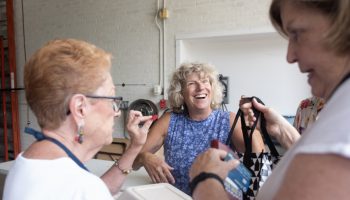
Kaitlyn Finchler
Contributing writer
Just 13 days before his probationary period at the National Oceanic and Atmospheric Administration would end, Tom Di Liberto was forced out of his federal position as a public affairs specialist and climate scientist.
About 600 other people found themselves in similar positions to Di Liberto, thanks to purges by the Department of Government Efficiency earlier this year.
“(It was) a lot of layoffs,” said Di Liberto, who had worked as a NOAA contractor for 13 years. “NOAA saw 11%, roughly, of its workforce already either fired, took early retirement or took a buyout. That’s pretty consistent across a lot of other agencies, too. I think the NIH saw even more than that.”
Di Liberto, now a media director for the nonprofit Climate Central, will deliver his lecture, “Climate Science and Disaster Preparedness in a Post-DOGE World,” at 12:15 p.m. today in Smith Wilkes Hall for the Chautauqua Climate Change Initiative.
“We’ve seen data sets disappear,” he said. “We’ve seen projects and grants that focused on building resilience to extreme heat or dealing with coastal flooding disappear, and a lot of the research that goes along with it.”
Universities are also “scrambling for funds,” Di Liberto said, because the money they thought they had for grants is threatened. He said “it’s scary” because the United States was “always the global leader” in researching climate and science in general.
“I always say the real superpower of the United States has been science and its innovation,” Di Liberto said. “We’re seeing a huge attack on it all, especially in climate science. The rest of the world would have to invest so much to even match what the United States already did, and now we’re seeing a drastic reduction in that.”
Climate change is going to happen regardless of whether or not research around it is funded, Di Liberto said. The rest of the world is moving on without the United States, and he said the country will still have to deal with the “increasing extremes” without “any of the benefits” of investments in renewable energy.
“I’m one of the few that actually has gotten a job, and I was lucky enough to find a job in the world of climate communication,” Di Liberto said. “I’m a climate scientist by training. … Now I’m … (at) Climate Central, whose mission is to not only help communicate the impacts of climate change, but help others do so as well.”
As climate scientists and those at nonprofits navigate these new changes, Di Liberto said the “scary parts” are what they don’t know and learning how to prepare for disasters in the wake of cuts.
“There’s been drastic cuts to the National Weather Service,” he said. “We’ve not even gotten to the busiest time of the hurricane season. We’ve seen so much flash flooding so far this year.”
Di Liberto said what concerns him is how prepared the National Weather Service is to deal with extremes, due to cuts in research.
“A lot of communities, now, won’t be able to improve the business codes or build the things to deal with flash flooding in the future,” he said. “We’re going to see an increase and continued trend in these really destructive designs if we don’t fund any of these things.”




